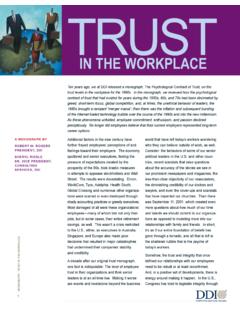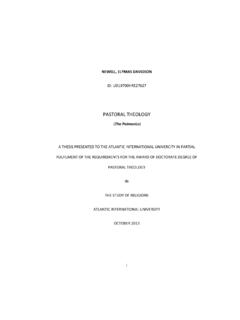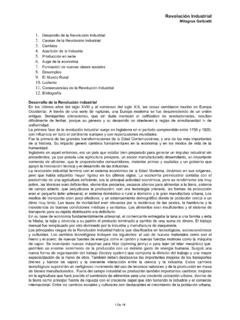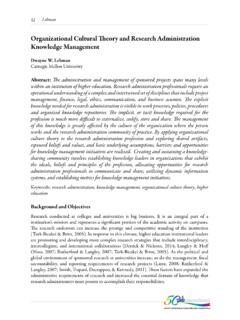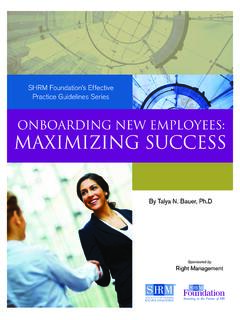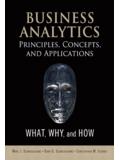Transcription of PRINCIPLES OF MANAGERIAL FINANCE
1 FREDDIE PEREZ ID #: UD4080 BBA9273 PRINCIPLES OF MANAGERIAL FINANCE A Phase II Course Presented To The Academic Department Of The School Of Business and Economics In Partial Fulfillment of the Requirements For The Degree of Doctorate in Business Administration ATLANTIC INTERNATIONAL UNIVERSITY TABLE OF CONTENTS 1. Introduction 2. Basic Concepts in PRINCIPLES of MANAGERIAL FINANCE a. MANAGERIAL FINANCE b. Financial Statements and Analysis c. Cash Flow and Financial Planning d. Time Value of Money e. Risk and Return f. Interest Rates and Bond Valuation g. Stock Valuation h. Capital Budgeting Cash Flows i. The Cost of Capital j.
2 Leverage and Capital Structure k. Dividend Policy l. Working Capital and Current Assets Management m. Current Liabilities Management 3. General Analysis 4. General Recommendations 5. Conclusions 6. References 1. INTRODUCTION MANAGERIAL FINANCE is essentially a combination of economy and accounting. First, FINANCE managers utilized accounting information, cash flows, etc., for planning and distribution of FINANCE resources of the company. Secondly, managers use economic PRINCIPLES as a guide for financial decision making that favor the interest of the organization. In other words, FINANCE constitutes an area applied in economics that is supported by accounting information.
3 Since FINANCE reflexes what adds value to a company, FINANCE managers constitute important individuals for the majority of business. Financial managers measure the development of the company, they determine the financial consequences, the tendencies and recommend on how to use the assets of the organization for the well being and survival of the business in the long run. At the same time financial managers seek for the best external financial institutions and recommend the best combination of financial resources for the shareholders of the company / organization. In today s world it is imperative to have the means and tools needed to be competitive; there must be a vision that there are no borders in order to make a business successful and to guarantee its survival in the long run.
4 Decision making based on different scenarios must be done in order to assure the right use of the assets on the company. In the following document we will present the concepts in PRINCIPLES of MANAGERIAL FINANCE and will present the basics to understand in order to make the best decision for a business / company. 2. BASIC CONCEPTS IN PRINCIPLES OF MANAGERIAL FINANCE a. MANAGERIAL FINANCE According to Gitman, Lawrence (2003), MANAGERIAL FINANCE is the branch of FINANCE that concerns itself with the MANAGERIAL significance of FINANCE techniques. It is focused on assessment rather than technique . The difference between a MANAGERIAL and a technical approach can be seen in the questions one might ask of annual reports.
5 One concerned with technique would be primarily interested in measurement. They would ask: are moneys being assigned to the right categories? Was generally accepted accounting practice GAAP followed? One concerned with management though would want to know what the figures mean. They might compare the returns to other businesses in their industry and ask: are we performing better or worse than our peers? If so, what is the source of the problem? Do we have the same profit margins? If not, why? Do we have the same expenses? Are we paying more for something than our peers? MANAGERIAL FINANCE is an interdisciplinary approach that borrows from both MANAGERIAL accounting and corporate FINANCE .
6 B. Financial Statements and Analysis Financial statements (or financial reports) are formal records of a business' financial activities. These statements provide an overview of a business' profitability and financial condition in both short and long term. There are four basic financial statements: 1. Balance sheet: also referred to as statement of financial condition, reports on a company's assets, liabilities and net equity as of a given point in time. 2. Income statement: also referred to as Profit or loss statement, reports on a company's results of operations over a period of time. 3. Cash flow statement: reports on a company's cash flow activities, particularly its operating, investing and financing activities.
7 4. Statement of retained earnings: explains the changes in a company's retained earnings over the reporting period. For large corporations, these statements are often complex and may include an extensive set of notes to the financial statements and management discussion and analysis. The notes typically describe each item on the balance sheet, income statement and cash flow statement in further detail. Notes to financial statements are considered an integral part of the financial statements. According to Gitman, Lawrence (2003), "The objective of financial statements is to provide information about the financial strength, performance and changes in financial position of an enterprise that is useful to a wide range of users in making economic decisions.
8 Financial statements should be understandable, relevant, reliable and comparable. Reported assets, liabilities and equity are directly related to an organization s financial position. Reported income and expenses are directly related to an organization s financial performance . Financial statements are intended to be understandable by readers who have a reasonable knowledge of business and economic activities and accounting and who are willing to study the information diligently. The difference between these inflows and outflows is the net income, also shown in the income statement.
9 Financial statements are used by a diverse group of parties, both inside and outside a business. Generally, these users are: 1. Internal Users: are owners, managers, employees and other parties who are directly connected with a company. Owners and managers require financial statements to make important business decisions that affect its continued operations. Financial analyses are then performed on these statements to provide management with a more detailed understanding of the figures. These statements are also used as part of management's report to its stockholders, as it form part of its Annual Report.
10 2. External Users: are potential investors, banks, government agencies and other parties who are outside the business but need financial information about the business for a diverse number of reasons. Prospective investors make use of financial statements to assess the viability of investing in a business. Financial analyses are often used by investors and is prepared by professionals (financial analysts), thus providing them with the basis in making investment decisions. Financial institutions (banks and other lending companies) use them to decide whether to grant a company with fresh working capital or extend debt securities (such as a long-term bank loan or debentures) to FINANCE expansion and other significant expenditures.


